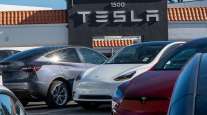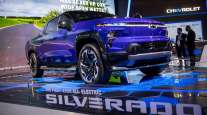Managing Editor, Features and Multimedia
Fleets, Tech Developers Chart Course to More Sustainable, Efficient Supply Chains
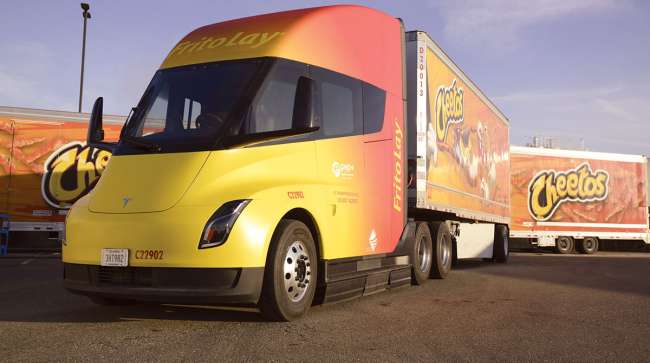
[Stay on top of transportation news: Get TTNews in your inbox.]
LAS VEGAS — Electric and autonomous vehicles can help build more sustainable and efficient supply chains, but the freight transportation sector will need to overcome various challenges to realize their potential.
Fleet operators and technology developers discussed how they are deploying these technologies to improve freight transportation during a Jan. 31 panel discussion at Manifest 2023, a conference focused on freight technology and the future of logistics.
Private fleet operator PepsiCo Inc. is pursuing a combination of technologies to help decarbonize its supply chain, said Adam Buttgenbach, director of fleet engineering and sustainability.
The beverage and snack-food company has committed to achieving net-zero emissions by 2040 with intermediate goals along the way.
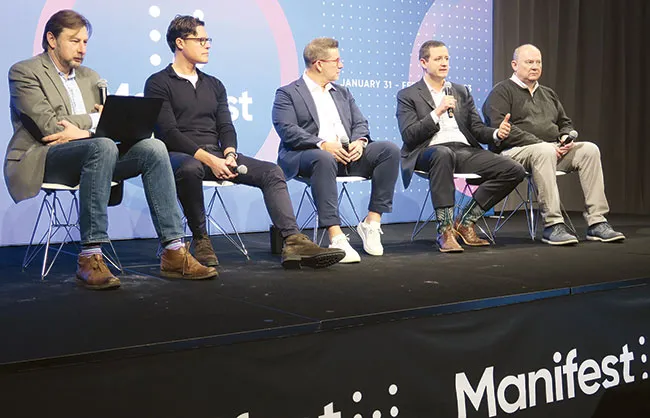
Alexei Andreev of AutoTech Ventures (left) moderates the Manifest panel of (left to right) Einride's Niklas Reinedahl, BrightDrop's Steve Hornyak, PepsiCo's Adam Buttgenbach and GE Appliances' Harry Chase. (Seth Clevenger/Transport Topics)
Buttgenbach pointed to the Modesto, Calif., facility operated by PepsiCo’s Frito-Lay division as a “template for the future on how we decarbonize.”
At that site, PepsiCo has implemented a mix of zero- and near zero-emission technologies across a range of duty cycles, including electrification and renewable natural gas.
“What we’ve seen so far, especially in Modesto, is that it’s not necessarily an ‘either-or’ solution as much as an ‘and’ solution between multiple technologies, especially if we want to get there quicker.”
The Modesto facility features 38 Volvos fueled by natural gas, along with the first Tesla Semi battery-electric tractors in commercial operation, as well as electric box trucks from Peterbilt, electric yard tractors from BYD, electric forklifts and on-site solar generation, battery storage and electric vehicle charging stations.
At Modesto, the company is using renewable electricity to power battery-electric vehicles, Buttgenbach said. Renewable natural gas, meanwhile, is not zero tailpipe emissions but does help reduce the company’s overall greenhouse gas emissions.

Host Seth Clevenger speaks with autonomous vehicle pioneer Don Burnette about the pros and cons of driverless cars and trucks. Hear the program above and at RoadSigns.TTNews.com.
Third of a three-part series on autonomous vehicles. Hear Part I here, and Part II here.
“When you’re thinking about transportation and logistics, it’s not just a zero-tailpipe emission solution — it’s a full well-to-wheels solution that we’re looking at,” Buttgenbach said. “And there are a lot of solutions out there that aren’t perfect, but they’re better than what we are doing today.”
He encouraged fleet operators interested in electrification to begin with a small pilot to gain a clear understanding of how the technology would fit into the business and the amount of power needed to support the electric fleet as it scales up.
It’s also important to share that information on expected EV charging demand with electric utilities early.
“We’ve seen a huge variability on what’s available from the grid depending on where you are,” Buttgenbach said. “Expect delays as you go to scale some of these vehicles, especially in certain parts of the country.”
PepsiCo, based in Purchase, N.Y., ranks No. 1 on the Transport Topics Top 100 list of the largest private carriers in North America.
Despite the common concerns about EV charging infrastructure and the electric power grid, fleet operators can still find cost-effective ways to introduce and support electric vehicles, said Steve Hornyak, chief commercial officer at BrightDrop, a subsidiary of General Motors that provides light-duty electric vehicles and other technologies for final-mile delivery.
He described last-mile as an ideal use case for electrification.
In addition to lower operating costs, electric vehicles can help boost driver comfort and retention, he said.
“The drivers want to stay,” he said. “They want to drive these vehicles. They enjoy it.”
When GE Appliances began deploying electric trucks, the company focused first on shorthaul runs between its warehouses and factories.
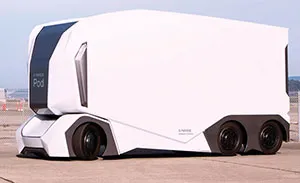
An Einride Pod electric vehicle. (Einride)
“That’s where we saw the most bang for the buck,” said Harry Chase, a senior director at the company.
GE Appliances has partnered with Einride to deploy electric and autonomous trucks.
Sweden-based Einride, which secured an additional $500 million in funding late last year, develops electric and autonomous vehicles for the freight transportation industry, including its fully autonomous electric Pod cargo vehicle with no cab.
Last year, Einride conducted a two-week pilot with GE Appliances using a fully autonomous electric vehicle without a safety driver on public roads in Selmer, Tenn., to move goods between a manufacturing facility and a warehouse.
“For us, autonomy, I believe, is critical to synchronizing our supply chain better,” GE Appliances’ Chase said.
Niklas Reinedahl, Einride’s general manager for North America, addressed the intersection between electrification and autonomy.
Want more news? Listen to today's daily briefing above or go here for more info
While most self-driving truck developers are designing and deploying their technology on trucks with internal combustion engines, Einride has focused its efforts on electric vehicles.
Coupling autonomous driving and electric powertrains “will definitely provide a more accelerated transition to more sustainable freight,” he said.
PepsiCo, meanwhile, has been spending a lot of time on advanced driver-assist technology that enhances safety with features such as lane keeping assistance and collision avoidance.
“That’s where we see an immediate impact today with the technology,” Buttgenbach said.


